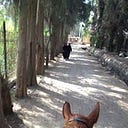Making Change
Inertia has to be the strongest force in the world today. Living in the countryside and working with donkeys and other animals, it is an important word when I have to explain that a donkey can pull a cart with 6 adults as long as there are no hills. Once the donkey is moving and has overcome the inertia of standing still to move into managing the inertia of movement, pulling the cart is relatively easy as long as there are no hills or sand pits in the track. It only becomes problematic if the cart has to be slowed or stopped, and that is our friend inertia again.
Social inertia is just as difficult to deal with. I’m relatively old and definitely not embarrassed about that. I’ve seen and experienced things and I remember them. I remember first starting to ride in the dirt roads of rural Giza about 25 years ago. It doesn’t even seem that long a time ago. For my mare, who had been raised in the front garden of a seaside villa and then moved to a stable, the noise and chaos of wandering poultry took a bit of time to get used to. The poultry were accustomed to avoiding passing donkey carts, bicycles, cars, children and so on, but all these small noisy creatures underfoot were new to my mare. At the time, in the mid 1990s, villagers left the poultry out to forage by day and brought them in at night. But in 2006, the authorities collected all of the loose poultry in Egypt in hopes of stopping bird flu. Needless to say, the cull didn’t work. Bird flu, similar to Covid, is a disease of closed crowded places and it will be with us for as long as factory farms are.
But in the meantime, between 2006 and now, sixteen years have passed and the children of ten in 2006, who were accustomed to the routine of indoor and outdoor poultry, have since forgotten what poultry out of doors did or ate. They are now 26 years old and they remember poultry living in rooms on the roof. When I am with the older women in the villages talking to them about how I can confirm through my personal experience at my farm that their poultry will thrive on a diet of fresh equine manure, some of them remember the days of chickens roaming the dirt roads and gardens, but no one was paying attention to the fine details of exactly WHAT the poultry were eating. Even I had assumed that they were eating insects in the manure but now when I remember, I realise that the manure piles never lasted longer than a day or so, surely not long enough to breed insects, so the poultry were actually eating the manure itself.
Now I am being a free manure salesperson, talking to anyone I can to convince them that it should at least be tried. I simply cannot believe that our farm’s horse manure has magical properties. I am mainly talking to the older women in the villages, women who are “influencers” to use a terrible word from social media. But I need just that. I need respected women to try this new old diet and find that it helps. They will get the younger women to try it out. And anyone who has lived in Egypt for any length of time at all knows full well that the fastest thing in the country is gossip.
